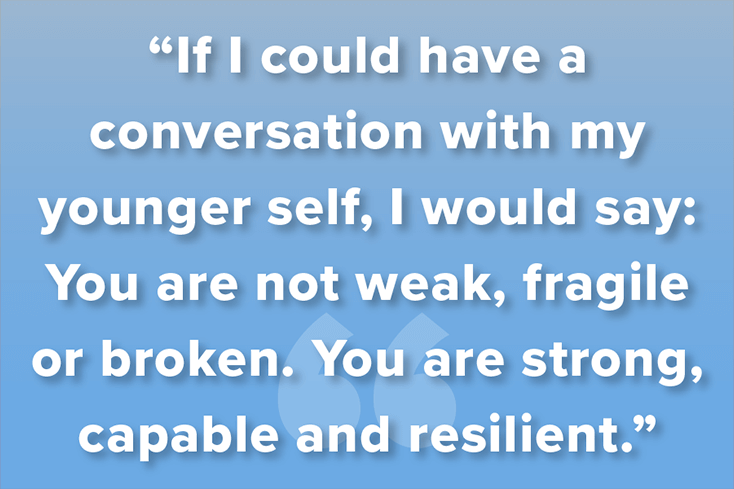June 30, 2022
By Amanda Buchner
 If I could have a conversation with my younger self, I would say: You are not weak, fragile or broken. You are strong, capable and resilient. You are a sensitive person who cares and feels things in a profoundly intense way — and while feeling everything all the time can be overwhelming, it has made you empathetic and compassionate to a whole new level.
If I could have a conversation with my younger self, I would say: You are not weak, fragile or broken. You are strong, capable and resilient. You are a sensitive person who cares and feels things in a profoundly intense way — and while feeling everything all the time can be overwhelming, it has made you empathetic and compassionate to a whole new level.
Growing up, I was a good student and athlete, on the honor roll and captain of my sports teams. I was a rule follower and did my best to stay out of the fray. I strove for perfection, put pressure on myself and sought reassurance from authority figures. It seemed like I had it all together, but I was just masking the discomfort I felt and the anxiety that seemed out of my control. I don’t recall a day going by when I didn’t have a stomachache or a headache. I was always jittery and could never sit still. I often experienced brain fog, especially in the middle of a test or presentation. I was overly concerned with fitting in and making friends never came easy. I felt awkward and lonely, and I tended to isolate myself from my peers. I found that I hated any chaos or confusion. I preferred structure and routine, and I needed to keep everything in my life neat and orderly. It was my way to control what I could.
Looking back as an adult, educator and mental health advocate, I realize that much of my behavior was due to the fact that my homelife was in a state of constant turmoil. Now I can recognize that there were warning signs during my childhood that pinpoint the rise of my anxiety.
The first time I had a panic attack I was in middle school. I thought the walls of my bedroom were closing in on me; it felt as if my body were shrinking in size, just as if I were Alice in Wonderland. I was trembling, my heart was racing, and I couldn’t catch my breath. There was a definite disconnect from reality. It took years to understand what was happening.
In college, I learned about generalized anxiety disorder. I recognized the signs and symptoms to be all those uncomfortable feelings and sensations I had been experiencing since I was a young. Acceptance came at that exact moment. This was a mental health condition that could be treated, just as if I had a physical health condition. It meant freedom, to some extent; maybe now I could stop feeling afraid and start living.
While awareness and acceptance are the cornerstones in my healing, that was only the beginning. The first step was to share my story and ask for help, which I learned is a sign of strength. While I once avoided conflict, I now needed to confront all these uncomfortable emotions and physical sensations head on. I needed to open up and become vulnerable.
To deal with these new feelings, I needed therapy and medication in my treatment plan — and I developed cognitive behavioral tools, such as deep breathing and mindfulness, to cope. Now, I exercise most days of the week; I prefer to play tennis, mountain bike or ski, but simple walks are helpful. I’ve found that fresh air and sunlight, adequate sleep and eating healthy all help to keep me feeling emotionally and physically balanced.
Establishing a healthy support system is also a vital piece of maintaining my mental health. I have had to determine whether certain relationships were healthy or depleting. I am beyond grateful to have such an amazingly supportive husband and children.
Ultimately, I have learned so much about myself (and mental health more broadly) in my struggles and successes with anxiety. I am aware that healing isn't linear — and I am ok with that. I have come to accept that it is ok to feel depressed or anxious. It does not define me, nor does it make me any less of a person. I recognize that I am going to make mistakes, have bad days, be less than perfect. I am human. Anxiety is just one part of who I am.
Amanda Buchner is a NAMI volunteer and is a regular contributor of NAMI In Our Own Voice presentations. She believes that healthy living encompasses the whole person and that the mind/body connection is crucial to achieving this balance. She is passionate about advocating to remove the stigma associated with mental illness.
We’re always accepting submissions to the NAMI Blog! We feature the latest research, stories of recovery, ways to end stigma and strategies for living well with mental illness. Most importantly: We feature your voices.
LEARN MORENAMI HelpLine is available M-F, 10 a.m. – 10 p.m. ET. Call 800-950-6264,
text “NAMI” to 62640, or email. In a crisis, call or text 988 (24/7).